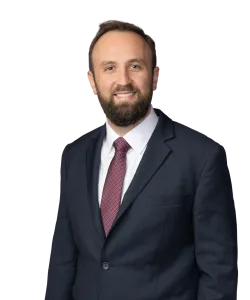Fifth Circuit Judge Questions Constitutionality of the FCA’s Qui Tam Provision
Headlines that Matter for Companies and Executives in Regulated Industries
Fifth Circuit Judge Questions Constitutionality of the FCA’s Qui Tam Provision
The Fifth Circuit affirmed the dismissal of a lawsuit brought under the False Claims Act (FCA) by a relator for failure to state a claim and failure to comply with Rule 9(b)’s heightened pleading standard. The defendant, Encompass Health Rehabilitation Hospital of Pearland, LLC, is an inpatient rehabilitation facility that provides services to patients following their release from acute care hospitals, and employed Deidra Gentry, the relator, as a sales representative. Gentry filed the lawsuit under the FCA’s qui tam provision, alleging, among other things, that Encompass presented false claims to Medicare. Specifically, Gentry alleged that Encompass engaged in fraudulent conduct by (1) training non-clinician sales representatives to conduct and develop “screening narratives” for new patients, and (2) falsely representing that admissions to Encompass were the result of clinicians’ independent medical judgment, even though Encompass allegedly “rubberstamp[ed] the non-clinical judgment of the sales representatives” who created screening narratives.
On recommendation from the magistrate judge, the district court granted Encompass’ Rule 12(b)(6) motion to dismiss all claims, finding that Gentry’s allegations were insufficiently plausible and she failed to plead with particularity, as required by Rules 8 and 9 of the Federal Rules of Civil Procedure.
The Fifth Circuit affirmed, and Judge James C. Ho wrote separately to urge the entire Fifth Circuit, “in an appropriate case,” to “revisit whether there are serious constitutional problems with the qui tam provisions of the False Claims Act.” Citing himself, Judge Ho opined that the FCA’s qui tam provision, like “federal civil service laws[,] infringe upon the President’s” Article II powers, because qui tam relators “are neither appointed by, nor accountable to, the President.” Judge Ho cited Justice Clarence Thomas’ solo dissent in United States ex rel. Polansky v. Executive Health Resources, Inc., wherein he expressed his reservations regarding the constitutionality of the FCA’s qui tam device, as a reason for the Fifth Circuit to revisit the issue in a future case.
The case is United States ex rel. Gentry v. Encompass Health Rehabilitation Hosp. of Pearland, LLC, No. 25-20093 (5th Cir. Nov. 3, 2025).
Johnson & Johnson Continues to Challenge the Constitutionality of the FCA Following $1.6 Billion Verdict
Janssen Products LP, a Johnson & Johnson subsidiary, appealed a $1.6 billion jury verdict for off-label promotion of HIV drugs Prezista and Intelence, in which it attacks the constitutionality of the FCA’s qui tam provision.
Janssen argues that the FCA’s qui tam mechanism violates Article II by delegating core executive power to private, financially motivated relators who prosecute cases in the name of the United States — even when the government disagrees with their theory. In its reply brief, filed on October 29, Janssen emphasizes how this case exemplifies the separation-of-powers problem. Relators secured a billion-dollar judgment on a liability theory that the United States disavows.
Janssen also contends that relators are constitutional “officers” who have not been appointed in accordance with the Appointments Clause. In support of this position, Janssen emphasizes two features of the relator position.
Broad Authority: Relators initiate litigation “for” and “in the name of the Government,” decide whom to sue and on what theories, force the government to investigate and respond, and bind the United States through judgments unless the government intervenes to dismiss or control. That the government may later intervene does not negate the relators’ initial exercise of executive authority.
Ongoing Position: Relators occupy a position defined by statute, with duties and compensation set by US Congress, and their authority persists through the life of the suit and certain interests can even transfer (e.g., to an estate). Temporary or case-bound service can still be an “office.” Thus, the relator functions as an unappointed officer.
The government’s attempts to recast qui tam suits as “personal” actions are, in Janssen’s view, incompatible with the statutory design: that claims vindicate governmental injuries and proceed in the government’s name.
Janssen further argues that the qui tam provision contravenes both the Vesting Clause and the Take Care Clause of Article II of the US Constitution. By empowering private relators to wield prosecutorial discretion on behalf of the United States, Janssen argues that Congress has diverted quintessential executive authority outside of presidential control. Janssen stresses how intermittent mechanisms — like seal-period review, intervention rights, or dismissal authority — do not cure these defects, because the executive must either divert resources to police private prosecutions or accept that private actors can press forward without government intervention.
Janssen asks that the judgment below be reversed or vacated and remanded for a new trial.
The case is United States v. Janssen Prods., No. 25-1818 (3rd Cir. 2025).
Read our prior alert on Janssen’s appeal here.
SDNY Indicts Former CEO and Chairman in Alleged $150 Million Fraud Scheme
Federal prosecutors in the Southern District of New York unsealed an indictment charging Bradley Heppner — the founder of Beneficient, a financial services start-up and the former chairman of GWG Holdings, Inc., a publicly traded financial services company — with securities fraud, wire fraud, conspiracy, false statements to auditors, and falsification of records in an alleged years-long scheme to siphon more than $150 million from GWG. The allegations center on Heppner’s undisclosed control of a purported third‑party lender, Highland Consolidated Limited Partnership (HCLP), which prosecutors describe as a shell company he operated for his benefit.
According to the indictment, Heppner allegedly engineered a $141 million “debt” on Beneficient’s books by reclassifying a mix of informal payments and personal expenditures as a senior loan owed to HCLP. Prosecutors allege that Heppner consolidated influence over GWG, becoming board chair and allegedly installing friends and associates as GWG’s board members. Thereafter, Heppner allegedly induced a special committee of GWG’s board to authorize at least approximately $300 million in investments and loans to Beneficient, in part to pay off the debt Beneficient purportedly owed to HCLP. Heppner did this by allegedly misrepresenting HCLP’s independence, concealing his control, and denying he would receive the repayments. Substantial portions of those funds were then paid to HCLP and ultimately routed to Heppner’s personal accounts, prosecutors allege. Heppner then allegedly used the funds to finance luxury renovations, travel, tax payments, and other personal expenses.
The indictment further alleges that Heppner deceived auditors in 2019 by creating and directing others to create backdated documents, fabricated emails, and misleading letters to portray HCLP as independent from Beneficient and Heppner. When the US Securities and Exchange Commission (SEC) later subpoenaed records in 2020, Heppner allegedly falsified minutes of an October 2019 board meeting to suggest he had disclosed his borrowing from HCLP — when in fact he had not — and caused those minutes to be provided to the SEC.
An indictment is merely an allegation. All defendants are presumed innocent until proven guilty beyond a reasonable doubt in a court of law.
The case is United States v. Heppner, 1:25-CR-00503 (S.D.N.Y).
Read the US Department of Justice’s (DOJ) press release here.
Former Researcher Convicted of Economic Espionage and Trade Secrets Theft
A federal jury recently convicted Ji Wang, a Chinese immigrant residing in Western New York, of engaging in economic espionage and trade secrets theft stemming from his work on a federally funded defense research program.
In 1998, Wang immigrated to the United States and began working for Corning Incorporated. Between 2002 and 2007, Wang was assigned to a joint research and development project funded by the Defense Advanced Research Projects Agency (DARPA) and Corning. Under the $11.4 million program, DARPA and Corning aimed to develop and increase the power of optical fibers for high-powered lasers with military and commercial applications, such as taking down drones and missiles.
From 2014 through 2017, however, Wang began negotiating with Chinese government entities to start a specialty fiber business in China. As part of the proposed deal, Wang would receive millions of dollars in investments from Chinese government entities that would in turn serve as shareholders in his venture while his business developed military applications and technology with the specialty fibers.
Wang planned on stealing Corning’s and DARPA’s trade-secret files and information to start his China-based business and ultimately stole hundreds of files that contained nonpublic data generated during the DARPA project. The stolen materials included trade-secret manufacturing technology that would have enabled him to fabricate a wide range of specialty optical fibers, including those used in fiber lasers.
However, law enforcement disrupted Wang’s plan before he could start his new business and exploit the technology he stole.
The court scheduled Wang’s sentencing for April 15, 2026. Economic espionage carries a maximum penalty of 15 years in prison and theft of trade secrets carries a maximum sentence of 10 years in prison.
Read the DOJ’s press release here.
Contacts
- Related Industries
- Related Practices







